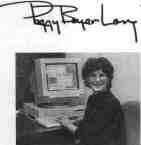
Are you among the vulnerable
Illinoisans? You might be surprised
by Peggy Boyer Long
Who might be left behind as Illinois enters a new millennium? Who, really, is vulnerable in these high-roller, high-tech times?
People unlucky enough to be with- out jobs or homes, certainly. People who have no skills, no connections, no hope. Older people on fixed incomes, most likely. The mentally ill.
People who suffer from disordered thinking, and those who lead disordered lives.
Anybody else?
"I'm afraid," labor lawyer Tom Geoghegan warns essayist Anne Keegan, "it's probably all of us."
We ask a lot of questions in this month's issue. But the answers are provisional. And dependent on perspective.
As part of the magazine's 25th anniversary series on key issues that face Illinoisans, we set out to determine who might be left out of this era's abundance.
We assigned Keegan, a free-lance journalist who spent, as it happens, more than a quarter century writing for the Chicago Tribune, often about the state's most vulnerable, and most invisible, people.
She set out to ask on our behalf who the vulnerables might be. Those who have been squeezed out of the work-
'We are all frail, mortal and going to die. But today, in this economic climate, I think even the so-called winners are more vulnerable than they know.' force, some told her. Young black men, others said. Farmers crowded off the land; single teen mothers; older women. The list was long.
Keegan worried about leaving somebody out. She needn't have. Her conclusion, and ours, is that we are all potentially at risk.
"We are all frail, mortal and going to die," Geoghegan told her. "But today, in this economic climate, I think even the so-called winners are more vulnerable than they know."
Keegan's essay begins on page 12.
Meanwhile, Illinois Issues' State- house bureau chief Burney Simpson took a close look at the shift in policies designed to find homes for the poorest citizens.
There are some hopeful answers in the assessment that begins on page 18. But some questions, as well.
Congress, Simpson writes, ordered local housing officials to tear down older public housing developments if they are too costly to rehab.
In Chicago, that meant an agreement between the city and the residents of the 45-year-old Henry Horner Homes to demolish and replace, unit for unit, that aging complex on the West Side.
Other residents of public low-income housing may not be so fortunate. As officials in Chicago and other cities tear down those crumbling and dangerous buildings, they are pushing an increasing number of low-income people into the private- sector housing market. How many of these people will end up on the street?
A new contributor to the magazine, writer Scott Koeneman, raises questions for us, too. He examines the growing debate about medical cover- age for those who are mentally ill.
His timely piece about "parity" begins on page 21. Should those who are mentally ill, he asks, receive equal treatment under their insurance policies as those who have other medical conditions?
Will you be left behind?
"Who is it," Keegan wonders, "that we must address our attention to as we leave an old and tired century and face a new one?"
4 / January 2000 Illinois Issues
|
Sam S. Manivong, Illinois Periodicals Online Coordinator Illinois Periodicals Online (IPO) is a digital imaging project at the Northern Illinois University Libraries funded by the Illinois State Library |